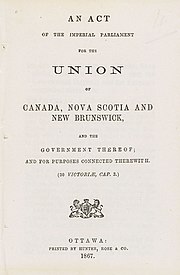 Global Information
Global InformationDobie v Temporalities Board information
| Dobie v Temporalities Board | |
|---|---|
 Dobie v Temporalities Board considered which government had jurisdiction to amend pre-Confederation statutes | |
| Court | Judicial Committee of the Privy Council |
| Full case name | Rev. Robert Dobie v Board for the Management of the Temporalities Fund of the Presbyterian Church of Canada in Connection with the Church of Scotland, and Others |
| Decided | January 21, 1882 |
| Citation(s) | [1882] UKPC 4, (1882) 7 App.Cas. 136 |
| Case history | |
| Prior action(s) | Dobie v Temporalities Board (1880), 3 L.N. 244 (Que. Q.B.) |
| Appealed from | Quebec Court of Queen's Bench (Appeal Side) |
| Court membership | |
| Judges sitting | Lord Blackburn Lord Watson Sir Barnes Peacock Sir Montague Smith Sir Robert P. Collier Sir Richard Couch Sir Arthur Hobhouse |
| Case opinions | |
| Decision by | Lord Watson |
| Keywords | |
| Constitutional law, pre-Confederation incorporations | |
Dobie v Temporalities Board is a Canadian constitutional law case. It was decided in 1881 by the Judicial Committee of the Privy Council, at that time the highest court in the British Empire, including Canada. The case concerned the power of the provinces and the federal Parliament to deal with legal rights created by statutes enacted prior to Confederation in 1867.
The case arose from the merger of four different Presbyterian churches in Canada in 1875 into one church, the Presbyterian Church of Canada. One of the predecessor churches, the "Presbyterian Church of Canada in connection with the Church of Scotland", held substantial investments for the payment of stipends and annuities for the clergy of that church. The investments were controlled by the Temporalities Board of that church, which was based in Montreal. Following the merger of the four churches, a Quebec statute transferred control of the Temporalities Board to the new Presbyterian Church of Canada. A group of dissentient clergy, led by Rev. Dobie, contested the validity of the union and the constitutional validity of the provincial statute which transferred the Temporalities Board to the new church.
The Judicial Committee concluded that only the federal Parliament had jurisdiction to amend the terms of the statute governing the Temporalities Board. The pre-Confederation legislation had applied throughout the Province of Canada, which had been split into the new provinces of Ontario and Quebec. Since the former statute applied in both provinces, only the federal Parliament could alter it after Confederation.